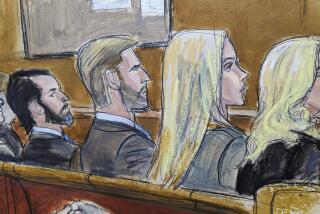Free country
- Share via
Judge Alex Kozinski’s statements about the stash of sexually explicit images he collected and that the public (until this week) could view on his website have been varied, although not necessarily inconsistent: He thought the site was for private storage and offered no public access (although he shared some of the material on the site with friends). People have been sending him this stuff for years (implying that it just accumulates, like junk mail). He might accidentally have uploaded the photos and videos when intending to upload something else. His son did it.
There’s a different statement we’d like to hear from him, and no, it’s not an apology, an expression of regret or even an explanation. It’s this: “So what?”
Not everyone may like it, but pornography is freely available on the Internet, whether it be from a commercial site dedicated to adults-only material or from the personal site of the chief judge of the U.S. 9th Circuit Court of Appeals. Any adult has, and ought to have, the right to view those sites and to download those photos and videos -- subject, of course, to the strictures of copyright law. People who don’t want to see such images can, and should, avoid them.
Scolds who argue that judges should uphold a higher standard of decorum than the common citizen and should somehow be prevented from engaging in such private activity as gathering subjectively amusing or even appalling smut should recall that the 1st Amendment is not limited to high-minded endeavors.
The controversy about the site, to which Kozinski blocked public access after a story by Times reporter Scott Glover, would be less engrossing were the judge not so highhanded when holding forth on judicial propriety or taking apart a legal argument. The story might have a higher profile on TV and radio if he were a supposedly typical 9th Circuit liberal, rather than one of the nation’s most brilliant conservative legal scholars. But it makes no difference whether the person with the porn site is left or right, smart or dull, a judge or anybody else.
It is also true that judges are charged with administering justice and instilling public confidence in the law. Under the circumstances, it makes sense for Kozinski to recuse himself from the obscenity trial he was assigned to hear -- not because there is any readily apparent conflict but because the website controversy has become a distraction and will undermine public trust in the verdict.
More to Read
Sign up for Essential California
The most important California stories and recommendations in your inbox every morning.
You may occasionally receive promotional content from the Los Angeles Times.










